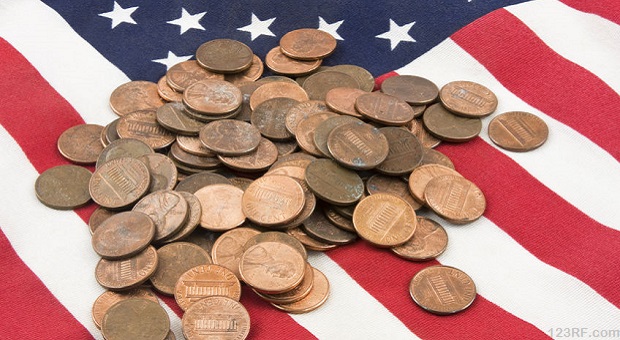Mention of the Great Depression readily conjures images of long lines with streets full of the skinny, unemployed masses. Beginning in 1929, the Great Depression resulted from a culmination of awful natural disasters as well as economic collapse, societal panic and the damage caused by repeated bank runs and the crash on Wall Street of October, 1929.
In the span of only a few weeks, investors in the United States saw more than 40 billion dollars vanish, and that was at a time when the US dollar was still held against a gold standard. The crash on Wall Street and the subsequent panic and bank runs that ensued led the citizen of the US from their heyday of the Roaring Twenties to the extreme poverty and hardship of the 1930s.
Combined with catastrophic crop failures in the Dust Bowl and record repossessions of family farms by the banks, much of the Midwest and the East Coast were left financially devastated.
Worst of all, many families were left in ruins. Farmers and homesteaders who had mortgaged their land in order to purchase livestock, tools or new farm machinery such as tractors and plows, lost even their capability to subsist and feed their own families.
Foreclosures hit record highs and a mass exodus (the Dust Bowl exodus) of people from the Midwest swept toward California.
Amidst the turmoil and ruin of the 1930s, though, life went on. In spite of soaring unemployment rates, Americans from all walks of life were able to forge ahead and survive. Not everyone suffered throughout the 1930s, though, even among the poorer groups of society.
Families that stayed together and pooled their resources, individuals who sought out any and all extra work they could or who had unique, niche talents that they could employ, and those with the will, fortitude and perhaps a touch of good luck (or the right mentality) managed to survive and maintain a decent standard of living in the process.

- Lighters are immensely useful for trade and barter during a crises, whether you live in a more remote rural area or in the heart of an urban metropolis. Standard Bic lighters are reasonably cheap and good to stock up on for use as barter and trade items, while you may want to stock up on some more expensive Zippo or other lighters that can be refilled over and over again for personal use.
- Toilet paper is probably still going to be available, but maybe not all the time. Amidst shortages and delays in the distribution of goods, you’re still gonna need to use the toilet and having toilet paper on hand is a very nice convenience. Alternatively, when there’s none to be had but the demand exists, you might be surprised what some people would be willing to trade for a roll of toilet paper.
- Tobacco or cigarettes are a very useful trade and barter item. Even (and perhaps especially) if you don’t smoke, a small stockpile of tobacco and/or cigarettes can serve you very well in the event of another depression. The fact is that there are a whole lot of smokers in the world and there’ll probably be a whole lot more during a depression when stress and tension run high, so you’ll have a valuable barter item when you most need it.
- Alcohol, like tobacco or cigarettes, is a useful product to stock up on. Pure grain alcohols and higher proof vodka, rum, whiskey and gin all store well and are imminently tradable. Finer wines, beers, malts and other alcoholic beverages can be stockpiled as well, for use as luxury trade or barter items, as well as for personal use if desired.
- Not everyone is interested in tobacco or alcohol, and there may be times when you just want to help someone out with a bowl of hot food. Rice, rolled oats, corn and beans are all reasonably cheap and store for years when properly canned or bagged. In addition to being easily traded, these foods are good staples for you and your family, as well as for use when more casual friends or acquaintances need an extra meal but you can’t afford to share your more valuable bread, meat, eggs or dairy.
- Utility tools, especially small and compact multi-tools from manufacturers like Gerber and the Leatherman Company can be immeasurably useful to have. By stocking up on a few extra tools, you’ll be able to give them to your friends or family in need and / or trade them for other valuable commodities that you need.
- Butane and other fuels are generally in very short supply, or are cost-prohibitively expensive, during economic turmoil or a prolonged depression. Rather than stockpiling butane for use fueling your camp stove or gas oven, one of the best uses of stored butane is in refilling lighters and small lanterns for others in trade for other items you need. With even a small stockpile of butane (think a couple of those little canisters for camp stoves) you’ll have a valuable resource that others are likely to need, and you can reap the benefits of having been better prepared when you trade for the material goods you need.
- Spices, such as sugar,salt and pepper as well as mustard seed, cinnamon (sticks and/or powder), and other herbs and spices offer you a touch of luxury in your cooking. During a time when imports and exports may be limited or nonexistent, being able to satisfy that craving you have for something sweet or exotic can do wonders for lifting the spirit and raising morale among your friends or family. Spices and herbs can also help make bland foods more palatable, especially important if you have to eat the same things day in and day out for weeks or months on end. Most spices and herbs are known to have varying beneficial health effects, as well, and can also be traded during times of scarcity.
- Batteries aren’t one of the most traditional of items to stock up on, but we live in a digital age now. The next depression doesn’t necessarily entail power outages or grid shutdown, in which case we’ll all want our electronic gadgets and gizmos to keep working. Batteries are small, cheap, easy to store, and can make great trade and barter items in the event of widespread chaos due to manufacturing or supply shortages.
Remember that production of basic goods will continue even in the event of a serious depression, because people still have to live, but there may well be shortages and prices are likely to vary steeply from week to week and month to month.
Another good way to limit expenditures and conserve resources during another depression is for families to band together. As opposed to simply representing more mouths to feed, families that bind together during hardships have more adults and able-bodied individuals who can work to bring in additional money, food or material goods.
At the same time, everyone’s living expenses are pooled, reducing how much rent or utility bills each adult member is responsible for. Even small contributions go a long way during hard times, so everyone in the family should be encouraged to get involved and do all that they can.
Finally, as obvious as this might seem, when you see the unemployment numbers soaring do everything you can to keep your job. Even during the worst years of the Great Depression, more than half the population was still employed and working; people still had to eat, sleep and wash their clothes, and production was still going on, albeit at far lower levels.
So if you know there are a hundred, or a thousand, people waiting to take your job in a second if you get fired, do what you can not to cross with your boss or make trouble, show up on time and do what you have to.
This article has been written by Bill White for Survivopedia.









Silas Longshot | June 11, 2013
|
I agree with all your selections, but only ‘conditionally’ with the tobacco idea. Nobody in our group smokes, so the stuff would absolutely sit unused for years. Being an ‘organic’ substance, it would undoubtedly go stale and deteriorate unless perhaps stored in a vacuumed bag, like with a FoodSaver. But in any condition, stale and moldy or stored well, a tobacco addict will trade for it
Max Malcolm | April 23, 2017
|
Not all tobacco goes stale or moldy. Cigars go up in value with age, if you own a humidor you can add a decent percent every year, and that is in good times. Pipe tobacco also keeps fairly well in airtight containers, and people can roll their own from loose/pipe tobacco.
Bob | June 11, 2013
|
Very important is the storability. Fortunately batteries have improved a lot in this regard. Alcahol and automotive fluids should be good too.
Talking to a depression survivor seems like a good idea.
samnjoeysgrama | June 11, 2013
|
During the last Great Depression, many, many farms were lost for unpaid taxes. If you go to the local county tax records, you will see the same current owners’ names come up over and over again on small parcels spread around your county. That is because there were still a few people with money who could pay the back taxes and they bought up all kinds of parcels for pennies on the dollar that were taken by the taxman. If you still have money during the coming collapse, you need to set aside some to pay your own taxes and perhaps buy up other land that will be sold by the tax collector. Don’t feel like a vulture. Someone will buy it, and sizable fortunes were made last time when land prices finally rebounded. Your kids could benefit rather than some bank who might buy it up.
Dan T. | June 11, 2013
|
I agree with the barter and trade items mentioned in this and previous articles, however I caution readers in the bartering of alcahol and tobacco products during desperate times due to a severe societal disruption or collapse when such items are no longer easily available. Any reader who has tried to quit smoking or drinking knows all too well what that’s like. We can only imagine to what level some people will go to feed the demons of addiction raging within them. Desperate people sometimes do desperate acts. It will not be a time of reason and rational thinking.
Pingback:Surviving the Next Great Depression - Help With Survival HQ | June 12, 2013
|
Ramon Hardsesty | July 24, 2013
|
I looked at this article very closely ! My father and mother lived in the Depression , and they had a garden in their back yard . They raised all kinds of Veggies . I do believe that I will survive this next depression ,all I need now is seed and a small plow. Not to mention the gold and silver I will be needing …
Oak | April 3, 2014
|
You coul’ndt pay me to ignore these posts!
Jack | June 12, 2013
|
I believe your barter list is indeed fairly accurate. But, I don’t agree with stocking-up an inventory of these items. Instead, I suggest that people learn how to PRODUCE items themselves. e.g. instead of stocking-up on alcohols, stock-up on the components to make your own alcohol products (e.g. wine-making gear, or beer-brewing gear, or gear to make your own still.) Note: Owning a still is illegal. But, owning the components to fabricate into a still is legal. So BE CAREFUL about the items/components you stockpile.
I also like to view barter items based on the following variables:
1.) Items that are exhaustible or consumable (so you develop a repeat-customer base; instead of one-time customers);
2.) Items that are multi-purpose (e.g. alcohol can be used as a fuel, as a drink, as a sterilizer, as a weapon, etc.);
3.) Items that take a certain level of skill/components to create. (if it’s an item that’s EASY to produce, then it won’t carry much value. Whereas, items that are a bit more complex to create, and require a certain level of skill/training/experience/expertise to produce, will have more value.) Plus, this helps reduce the chances of others bumping you off. e.g. they NEED you and your expertise, to keep product development underway;
4.) Items that YOU need, too. (e.g. if you are a non-smoker, then the ability to produce tobacco isn’t really of value — to YOU!);
5.) Items that are addictive. Again, think “repeat customers!” “Yes,” it’s sad to prey on those who have an addiction. Justify your actions by seeing that you are providing a source of income/barter/revenue to feed your family.;
6.) Items that can ideally be produced indoors, 7×24, with minimal outside input. This is a nearly-impossible goal. Nevertheless, the more your can keep your production/assembly line indoors and out-of-sight (or at least out-of-reach) of others, the easier it will for you to KEEP your production line.;
7.) Items that can be produced as quickly as possible. Example: Decent tobacco production requires a certain amount of land for growing the product (plus time to do so.) Then, it needs to be harvested, dried, etc. Plus, it only offers one main season per year (in most climates.) It also has limited climates. Whereas, growing something like marijuana can be done in a closet or rooftop. Indoors, it could be grown year-round (e.g. three harvests per year.) (Note: The above was for hypothetical comparison, only.) (wink)
There are inherit risks with the production and storage of ANY barter item. We all need to weigh or risks, against our returns/needs.
Personally, one of MY favorite items, is “energy production” (aka electricity.) A few solar panels and/or wind or water generator, plus a battery bank and power inverters and such — and a person can generate electricity fairly quietly and safely. Mounting the gear to a roof or high atop a pole can help reduce hostile takeovers. The ability to recharge batteries for neighbors WILL become a valuable, resalable asset.
Peace.
Jack.
Northbynorthwest | June 12, 2013
|
I am in complete agreement with you. Stocking up on the items to make / manufacture or produce something is a far smarter idea than stocking up on stuff that “might one day” be useful to barter with. Imagine a simple device and a trick or two to turn old news papers into softer toilet paper for example. You not only create a very valuable barter item, but can actually make some serious money in the process.
Practical Parsimony | June 12, 2013
|
“Families that stayed together and pooled their resources, individuals who sought out any and all extra work they could or who had unique, niche talents that they could employ, and those with the will, fortitude and perhaps a touch of good luck (or the right mentality) managed to survive and maintain a decent standard of living in the process.”
Many people and families with the attributes you describe did flounder and fail, often starving in the process. My mother grew up during the Great Depression. She said they were poor to begin with and the Depression barely affected them in Mississippi. Others did not fare well at all, despite their willingness to work at anything or having talents.
Tom Wacker | June 12, 2013
|
I ask my 80 year old Uncle how people survived the “Great Depression” in the South which then was primarily farming, fishing and timber production activities. He said that Grandpa made moonshine. Then I ask him what the one most important item people did not have readily available during that time…surprisingly he said ammunition. He said people would give his older brother ammo and then pay the brother for rabbits and squirrels that he killed with their ammo….so maybe the ammo grab by the facists in this government has merit…..
Karen Moore | June 13, 2013
|
Another GREAT thing to stockpile that wasn’t mentioned here is garden seeds…preferably of the heirloom, non-hybridized varities so you can save your own seeds. I truly believe that garden seeds will someday be worth their weight in gold! People will be tearing up their lawns to plant gardens. City dwellers will also be tearing up asphalt and concrete in the unused, blighted part of inner cities to create community gardens. Gardeners ROCK! One more tip: better starting learning NOW, becuase it’s not always as easy as it looks…as anyone who’s done it knows!
Jeanne roberts | June 16, 2013
|
You can store all kinds of seeds, but if you don’t store them correctly they won’t be viable. Put them in zip-lock bags in the refrigerator. They will keep several years that way. Harvesting seeds from vegetables you plant insures continued production. Just don’t let the seeds get too warm.
Michael Wallace | March 25, 2014
|
Does it harm the seeds if they are in freezing temperatures during the winter. I have somme stored in a shed and wondered if they will be good to plant?
Ronald Jeter | June 20, 2013
|
Check Google about honey bees
and uses oh Honey as a sweetener
Bees can be raised in your own yard they work for free
honey can be used as a substitue for sugar
Lady in Red | June 21, 2013
|
Very good article thank-you. What we have today that they didn’t have during the great depression is Vac and Seal . My personal favorite is Foodsaver Vacuum. That is what I use you can use any that are out there. Vac and Seal will save you literally thousands of dollars. Vacuum Seal is waterproof and the plastic is sturdy.
Vac and Seal your seeds, tobacco, dehydrated food (which you can do yourself at home), spices, powder soup (onion soup mix) etc…., matches, candles, first aid supplies, creams, ointments, prescriptions, clothes, paper, pens, toilet paper, handbooks, manuals, you can also vacuum water or any liquid that is freezable first and can turn into a solid, then once frozen vacuum it and then seal it and then store it …you get the idea. You can vacuum seal practically anything and it will last for years and years. Anything that has a shelf life will last for years longer
You could also, grow plants using vacuum seal plastic bag: make a plastic bag put in it small pebbles or sand on the bottom of the bag, then some moisten soil and about a tsp of coffee grinds mixed in the moisten soil and about a cup or two, wrap your seed in news paper and then put your seed in the soil put enough soil in to anchor your plants then the seal it don’t vacuum it and just leave it alone in the house in the sun or outside in the sun and watch it grow. Or you could do this: make a plastic bag put in it small pebbles or sand, then some dry soil and about a tsp of coffee grinds mixed in the soil and about a cup or two, wrap your seed in news paper and then put your seed in the dry soil put enough soil in to anchor your plants then vacuum seal it and put it in storage. When you are ready to use it put it in a container or plant it in the ground and water it and there you have a plant.
That is the upside to using vacuum seal. 4 easy steps: Vacuum- seal it- put it in ziplock bags and store it.
Now the downside it is not re-sealable once it is opened. Buy plenty of those thick rubber bands (like you get with broccoli) and wrap it around whatever you just opened and the contents should stay in the bag if not tie it using string or whatever or put it in ziplock bags. You might want to vacuum seal rubber bands because they have a shelf life. However, with that being said you could save yourself and others by vacuuming and sealing objects, food, drugs, clothes or whatever you think you and your family might need during crises.
About storing: store into containers that the bugs and mice can’t get into and or the weather can’t destroy for example: a huge plastic tote, five gallon buckets, tactical pen box, drums that are sealed, Water Resistant Waterproof Dry Bag etc….. Store all items out of the sun unless you are going to use it.
About the great depression the people they certainly had the knowledge, the guts, determination, backbone and the heart and they weren’t lazy like society is today they had the skills that we obviously lack today and survived quite well. If are ancestors survived why can’t you? If you had to start from scratch could you? I would hope the answer is yes and you get what you need to survive and protect you and or your family. If you don’t have answers look for them by doing some reading and research and ask others who have that knowledge. But don’t be lazy and get off your butt and do it yourself and don’t rely on the government or anyone else because in the end the government and some of your friends and family members might not be there to help you. You will just have to help yourself and help others when you can and it will come back to you (That I promise). You can do it you are strong enough.
Anyways, I hope this helps and take care.
All the best, Lady in Red
My Homepage | July 4, 2013
|
… [Trackback]…
[…] There you will find 96257 more Infos: survivopedia.com/surviving-great-depression/ […]…
Ramon Hardsesty | July 25, 2013
|
During the Great Depression , my grandmother had a garden in her back yard ,my father was working for the Army building railroads . H would send gold and silver back to my grand mother . When he could get home he would either work the garden or do some hunting for meat . One year , he told me, “He got two big dear and a bunch of rabbits and other small game . “They ate good and had some money for the end of the month.. Gold could have been had if it was minted before 1900 and silver was always plentiful , because it was cheap ..
Ramon Hardsesty | July 25, 2013
|
My mothers parents was just like my fathers parents . They had gardens and raised rabbits and chickens for meat . They also milked cows to trade with. My grandfather always found work , and kept busy. He told me one day ” The place where he worked would pay him $1.00 an hour . During pay days they would give them silver or cash.. NO CHECKS! ” Is what he told me. I do believe that if and when this happens , I will know what to do ….
alcohol fuel still | September 15, 2013
|
Touche. Sound arguments. Keep up the good spirit.
richard Donegan | March 27, 2014
|
Don’t bring strangers to wherever you are storing your supplies and let them see the entirety of what you have. Barter some place away from where you store things and agree to meet and exchange items at some open, populated place. You don’t want anyone to know all that you have and where you keep it.
Pingback:10 Professions To Learn From To Survive The End Of The World | Survivopedia | October 30, 2017
|
Pingback:The Remnant Threat Of The Globalist Elite | Survivopedia | June 8, 2018
|